Boilers play a vital role in the industrial and commercial sectors as they are used to produce steam and provide heat to meet the energy needs of a wide range of applications. This includes heating, power production, industrial processes, clean hot water supply, and more. The proper functioning of boilers is therefore essential to ensure the continuity and high efficiency of the production process. Boiler water treatment helps to maintain the performance and longevity of boilers, thereby ensuring the smooth running of industrial and commercial activities.
What is boiler water?
Boiler water treatment is the regulation and treatment of boiler feed water. To maintain boiler water treatment, there must be continuous heat exchange, protection from high-quality steam, and corrosion protection. Boilers are designed to heat fluids, after which the vaporized or heated fluid will leave the boiler and be used for heating applications and various industrial processes such as sanitation and cooking. The main industries that use boilers include the pharmaceutical, textile, steel, and chemical industries.
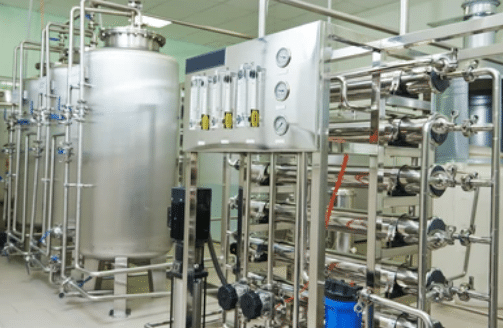
Why do I need to treat my boiler water?
- Prevention of scale and deposit formation: Dissolved salts present in hard water, such as carbonates and sulfates, can precipitate and form scale during the heating process. This scale can build up on heating surfaces inside the boiler, reducing heat transfer efficiency and increasing energy consumption. Scale formation can be reduced through water treatment.
- Prevent corrosion: Oxygen and other dissolved gases in boiler water can initiate metal corrosion. Corrosion may damage the structure of the boiler, reduce its life, and may lead to leaks. Water treatment reduces the risk of corrosion by lowering the concentration of oxygen and other corrosive factors.
- Control of microbial growth: Microorganisms such as bacteria, algae, and fungi may be present in the water and they can initiate biofouling and corrosion. Microbial growth can be effectively controlled and prevented through the use of appropriate chemicals.
- Ensure consistent water quality: Boilers need to have consistent water quality to ensure stable boiler operation and efficient heat exchange. Water treatment helps to maintain consistent water quality and avoid unexpected problems.
Boiler water treatment is a critical step in ensuring the safe and efficient operation of your boiler system. It helps prevent scale, corrosion, microbial growth, and other problems, extends boiler life, reduces maintenance costs, and improves energy efficiency.
Advantages And Disadvantages Of Boiler Water
Advantages
- Efficient heat transfer: Water has a high heat capacity and thermal conductivity, making it an efficient medium for transferring heat energy. Boiler system can efficiently convert heat energy from fuel to steam or hot water.
- Wide range of applications: Boiler water is used in a number of fields, including power generation, heating, industrial processes and chemical production. It is a versatile heat transfer medium.
- Controllability: Boiler systems allow precise control of water temperature, pressure and flow to meet specific thermal energy requirements.
- Renewable resource: Water is a renewable resource that can be recycled and treated to reduce environmental impact.
Disadvantages
- Corrosion and scaling: Boiler water may contain dissolved oxygen, alkalinity, and hardness salts, components that can lead to corrosion and scaling problems that can damage the boiler system.
- Maintenance complexity: Boiler systems require regular maintenance, including cleaning, water treatment and monitoring of water quality to ensure efficient operation.
- Environmental concerns: Boiler emissions may include wastewater and exhaust gases, which need to be tightly controlled to minimize environmental impact.
- Energy consumption: Boiler systems require fuel (e.g., natural gas, coal, oil, etc.) to heat water, which involves energy consumption and associated costs.
- Footprint: Large boiler systems may require a large footprint, which can be a disadvantage in some applications.
Boiler water is an effective heat transfer medium, but water quality, corrosion, and environmental issues must be considered and managed during use and maintenance.
Boiler Water Quality Components
| Water quality constituents | Range of values |
| PH | 9.0 – 10.5 |
| Hardness | < 0.5 mg/L |
| TDS | < 350 mg/L |
| DO | 0.02 mg/L |
| Silicon | < 0.05 mg/L |
| Sodium | < 10 mg/L |
| Chlorine | < 2 mg/L |
| Iron | < 0.1 mg/L |
| Ammonia | < 0.2 mg/L |
Chemicals Suitable For Treating Boiler Water
In boiler water treatment, a variety of chemicals are used to ensure proper water quality and prevent corrosion, scale, and other problems.
- Buffer: Used to control the alkalinity of the water to maintain a proper pH and prevent boiler water acidification.
- Hardness Stabilizer: Used to control the hardness of water to reduce the formation of scale.
- Microcapsule corrosion inhibitors: Used to reduce corrosion in the boiler system.
- Antiprecipitant: Used to prevent the formation of scale and reduce clogging of pipes and heat exchangers.
- Redox agents: To give dissolved gases, dissolved oxygen, especially oxygen, in water. A reducing agent, such as sodium bisulfite, is used to reduce the dissolved oxygen to insoluble oxygen or other compounds. This can be accomplished by injecting a reducing agent into the boiler water.
- Alkaline cleaners: For cleaning and maintenance of boiler systems.
- Phosphating agents: To reduce corrosion on boiler piping and equipment.
- Biocides: Used to control the growth of microorganisms in the boiler system and to prevent biological contamination.
- Ammonia: Used to adjust the pH of water to reduce corrosion.
- Chemical cleaners: For cleaning and maintenance of boiler systems.
How to treat boiler water?
Boiler water treatment is a critical step in ensuring efficient and reliable operation of the boiler system.
Water quality testing and analysis: The first step in boiler water treatment is to perform detailed testing and analysis of raw water samples to determine water quality characteristics. These tests typically include determining hardness, TDS (total dissolved solids), pH, oxygen content, alkalinity, chlorine content and microbial contamination levels.
Pre-treatment: Raw water enters to remove large suspended particles and debris. A filter is used to remove solid particles from the water, separating solids from liquids and preventing them from entering the boiler system and causing blockages. Filters can be microporous filters, sand filters or other types of physical filtration equipment. This is usually accomplished through processes such as filtration, sedimentation, or centrifugation. After pretreatment, the water can undergo removal of boiler water with clarifiers.
Softening: If the feed water is of high hardness, it may need to be softened. Hardness is caused by the presence of minerals such as calcium and magnesium, which cause scaling. Softening can be achieved by removing the hardness ions through an ion exchange process or lime-soda ash treatment. By using a softener containing a special resin, hard water is passed through a bed of resin in which the resin particles adsorb and exchange calcium and magnesium ions in the water, replacing them with sodium ions.
Reverse osmosis (RO): In some cases, reverse osmosis can be used to remove dissolved salts and other impurities. RO uses a semi-permeable membrane to separate ions and contaminants from water, producing pure water for boiler feed.
Oxygen removal: Dissolved gases in feedwater, especially oxygen, can cause boiler corrosion and pitting. Redox agents, such as sodium bisulfite, are used to remove oxygen from boiler water. Oxygen is one of the main factors causing corrosion.
Chemical treatment: Chemical treatment is often used to further control impurities and prevent corrosion. This may involve the addition of chemicals such as corrosion inhibitors, pH adjusters, deoxidizers and defoamers to the feed water.
Disinfection:
Disinfectants such as sodium hypochlorite are added to control the growth of microorganisms and prevent the formation of algae and bacteria. Kuosi sodium hypochlorite machine can be used to assist in disinfection.
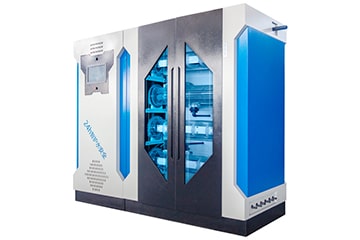
Ozonation: Ozone is a powerful oxidizing agent that can kill bacteria, viruses, and other microorganisms. Ozonation is more effective than chlorination at killing some microorganisms, such as Giardia and Cryptosporidium. However, ozone is more expensive than chlorine and can be difficult to store and transport. KUOSI ozone generator can act as a disinfectant.
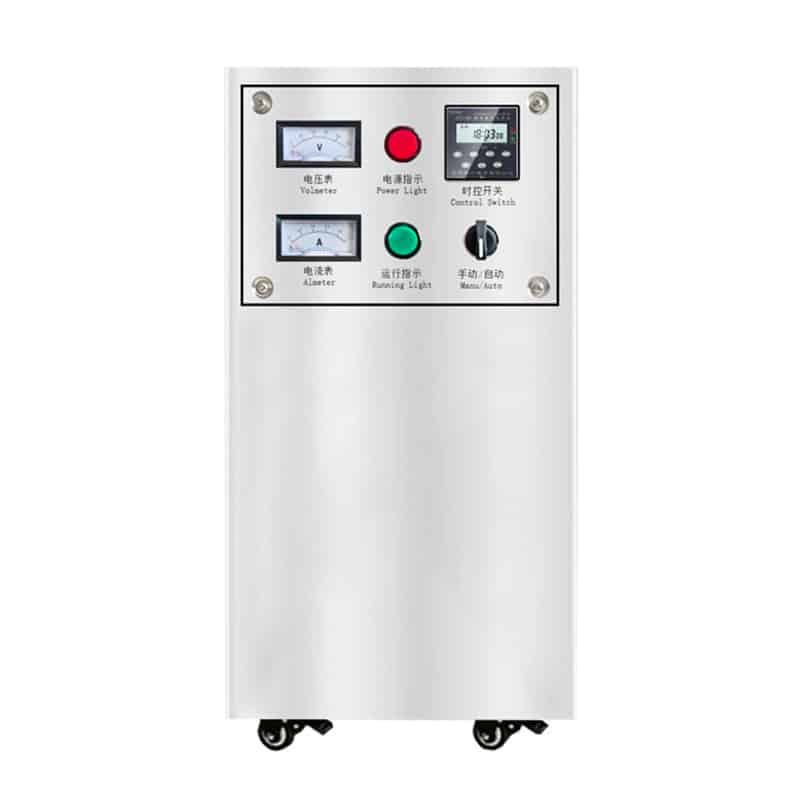
Chemical minimizers: Chemical minimizers are used to prevent the formation of scale and sludge.
Water quality monitoring: The quality of the boiler water is continuously monitored to ensure that it remains within appropriate limits. This includes automatic control systems and on-line monitoring equipment.
How do you treat boiler water for wastewater?
Wastewater collection: First, wastewater is collected from the boiler system, including discharges from the boiler, condensate, cooling water, and other wastewater that may contain organic and inorganic contaminants.
Preliminary separation: The wastewater may contain suspended matter, impurities, and sediments, and the wastewater is separated from the impurities through the use of a wastewater screen, the screening elements of Kuosi rotating drum screen may be wedge-shaped wire baskets with a spacing of 0.5-6 mm or perforated tumblers with a spacing of 1-6 mm.
PH adjustment: The pH of the wastewater may need to be adjusted to comply with discharge standards. Chloramine is a chemical commonly used in wastewater treatment. Chloramine is usually one of the chloramine T or chloramine B, both of which are disinfectants with strong oxidizing properties, and can also be used for pH adjustment.
Solid-liquid separation: Wastewater may contain suspended particles or turbidity, and these can be separated by filtration, sedimentation, and aeration.
- Sedimentation tanks: Sedimentation tanks are a traditional solid-liquid separation device that separates solid particles by settling them to the bottom of the tank either by standing or by adding coagulants. This effectively removes larger particulate matter.
- Air floating machine: An air flotation machine is a device that uses air bubbles to float suspended solids and separate them from the water. This is very effective in removing small particulate matter and turbid wastewater. Dissolved air flotation is a water purification process that uses air to remove suspended solids from the surface of treated water.
- Aeration Tanks: Aeration tanks are typically used to remove dissolved gases rather than solid particles. They remove gases, such as ammonia nitrogen, by injecting air into the water.
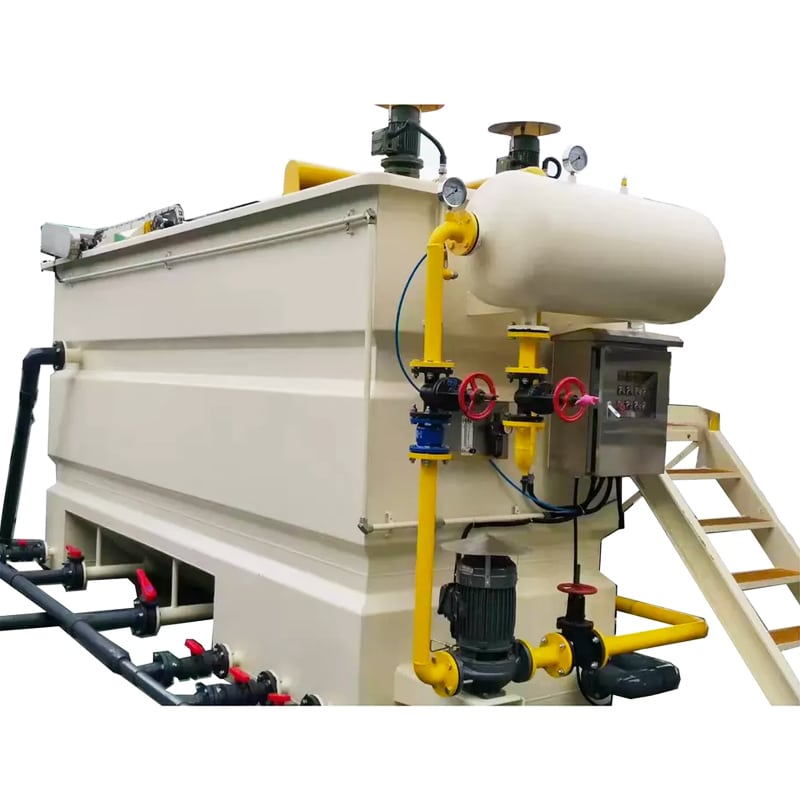
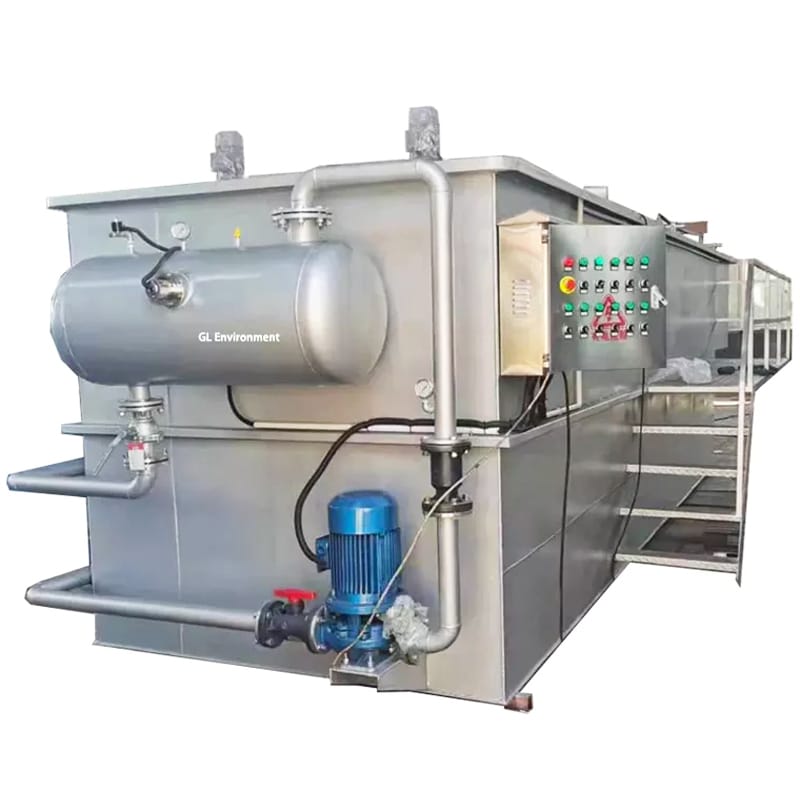
Chemical treatment: Wastewater may contain harmful substances, such as heavy metal ions. Proper chemical treatment can precipitate, neutralize, or convert these substances into non-hazardous forms.
Disinfection: Bacteria, and other microorganisms may be present in wastewater. The disinfection process can kill these microorganisms through the use of chlorine, ozone, or ultraviolet radiation.
Monitoring and testing: Treated wastewater requires periodic monitoring and testing to ensure that it meets discharge regulations and standards. This includes the measurement of various water quality parameters such as chemical oxidative oxygen demand (COD), total suspended solids (TSS), ammonia, and nitrogen.
Selection Of Dosing System Or Polymer Preparation System
The choice of using a dosing system or a polymer preparation system to treat boiler water depends on the specific needs, system design and water quality requirements.
Dosing system
Precise control: The chemical dosing system allows you to precisely control the dosage of different chemicals to meet the specific water quality requirements of the boiler water.
Wide applicability: The dosing system is suitable for different types of boiler systems and can deal with a variety of water quality problems, such as hardness, corrosion, scale, etc.
Real-time adjustment: You can adjust chemical additions in real-time based on the results of water quality monitoring to maintain stable water quality.
Polymer Preparation System
Sludge control: Polymer preparation systems are often used to control sludge generation, reduce waste production, and help protect the environment.
Simplified operation: For some specific boiler systems, polymer preparation systems may be easier to operate and maintain.
Energy Efficiency: Polymers can improve water flow and contribute to the heat transfer efficiency of heat exchangers.
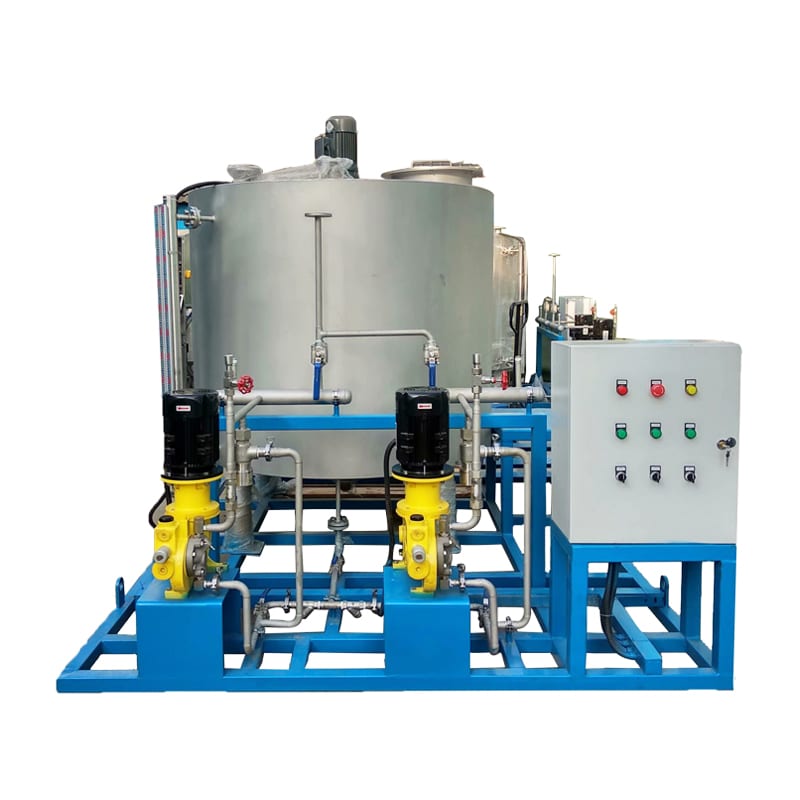
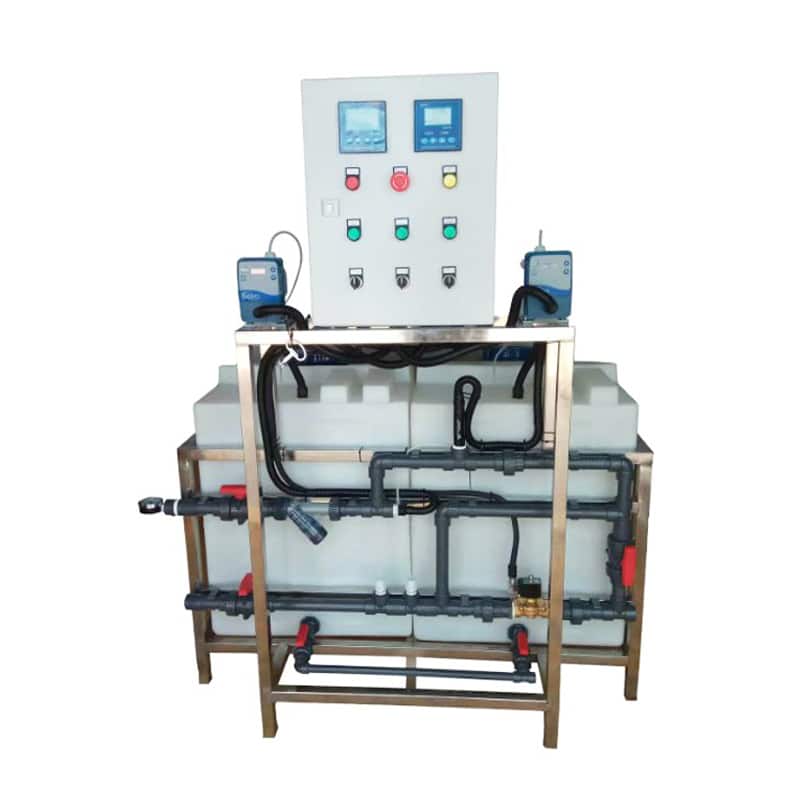
Summary
Boiler water treatment is a complex project that requires experience and expertise. A good boiler water treatment can extend boiler life, improve energy efficiency, reduce maintenance costs, and reduce operational risks. Therefore, regular water quality monitoring and appropriate chemical treatment are key to ensuring the proper operation of your boiler system.
KUOSI, as a leading water treatment manufacturer in China with more than 16 years of rich experience in the field of wastewater treatment, offers sludge dryers, aeration blowers, belt filter presses, screw presses, and grit removal equipment. Feel free to contact us.
